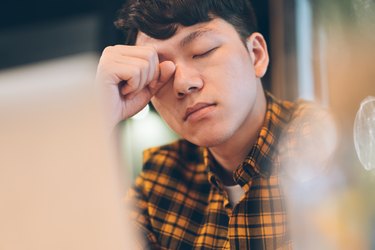
Irritable bowel syndrome (IBS) affects as many as 10 to 15 percent of American adults, according to the American College of Gastroenterology, and its symptoms — namely stomach pain, bloating, gas, diarrhea, constipation and fatigue — can dramatically affect quality of life.
Even so, IBS fatigue tends to get overlooked because there can be so many other reasons to feel tired, says William J. Bulsiewicz, MD, a gastroenterologist in Mount Pleasant, S.C. and author of the forthcoming book Fiber Fueled.
Video of the Day
Video of the Day
What’s Behind IBS Fatigue?
"We don't have a definitive answer for why IBS causes fatigue, but we do know that there is an extreme form of fatigue known as chronic fatigue syndrome (CFS) that tends to occur with IBS, and researchers think that an imbalance of good and bad bacteria in the gut may be responsible for both conditions," Dr. Bulsiewicz explains. When the bad bacteria outweigh the good in the gut, IBS symptoms such as diarrhea, constipation or fatigue may occur.
When a team of researchers analyzed stool samples from 50 people with CFS and 50 without this condition, they found clear differences in bacteria patterns among those with CFS. What's more, 21 of the 50 people with CFS also had IBS, and their bacterial milieu was different from that of their counterparts who had just CFS. In particular, people with IBS had higher levels of a type of bacteria called Alistipes and lower levels of a type of bacteria called Faecalibacterium.
These findings, published December 2017 in the journal Microbiome, suggest that dysbiosis, or the imbalance of bugs in the gut, may be a smoking gun, and if this proves true, diet may play a big role in reversing IBS fatigue, Dr. Bulsiewicz says.
Read More: Foods That Make You Tired
Using Diet to Conquer IBS Fatigue
Fiber is a prebiotic food, Dr. Bulsiewicz adds. This means that fiber feeds the good bacteria in your gut. Fiber also makes stool softer and easier to pass. "Eating fiber can help remodel your gut microbiome and treat constipation," he says. "A pill treats only the symptoms and doesn't get at the heart of the problem the way that eating more fiber does."
When upping your fiber intake, start slow and low, he warns. "When ramped up appropriately, there is no such thing as too much fiber, but it's possible to go too hard too fast, particularly if you have a damaged gut," he says. When you eat too much fiber too quickly, you can become gassy, which may trigger IBS symptoms.
The 2015-2020 Dietary Guidelines for Americans suggest that adults aim for 22 to 34 grams of fiber a day, depending on their age and sex. Most people fall short. Start by adding 2 to 3 grams a day to what you're taking in now, and that should help minimize gas and bloating from the increased fiber intake, according to the National Institute of Diabetes and Digestive and Kidney Diseases.
The soluble type of fiber, which is found in abundance in beans, fruit and oat products, is especially helpful for relieving IBS symptoms. The other type, insoluble fiber, is primarily found in vegetables and whole grains.
Drink enough water too, Bulsiewicz adds. Staying hydrated helps the fiber pass more efficiently through your body.
Read more: Does Drinking Water Reduce Bloating?
How Exercise and Supplements May Help
Exercising regularly may also help relieve IBS fatigue. A January 2015 study in the World Journal of Gastroenterology found that women with IBS who upped their physical activity showed improvements in IBS symptoms including fatigue, depression and anxiety. The American Heart Association recommends that adults get at least 150 minutes of moderate-intensity aerobic activity or 75 minutes of vigorous aerobic activity each week.
If your symptoms aren't improving with a better diet and more exercise, probiotic foods or supplements may make a difference. A review of 11 studies published in the September 2019 issue of Nutrients found that supplementation with probiotics helped relieve IBS symptoms in seven of them, and multi-strain supplements tended to confer the most benefits, compared with single-strain ones. "It's very personal and there will be some trial and error involved to see which strains of bacteria are useful for you," Dr. Bulsiewicz says.
- American College of Gastroenterology: “IBS”
- Microbiome: “Fecal Metagenomic Profiles in Subgroups of Patients with Myalgic Encephalomyelitis/Chronic Fatigue Syndrome”
- U.S. Department of Health and Human Services: “The 2015-2020 Dietary Guidelines for Americans”
- World Journal of Gastroenterology: “Intervention to Increase Physical Activity in Irritable Bowel Syndrome Shows Long-term Positive Effects”
- National Institute of Diabetes and Digestive and Kidney Diseases: “IBS, Eating, Diet and Nutrition”
- American Heart Association: “American Heart Association Recommendations for Physical Activity in Adults and Kids”
- Nutrients: “Probiotics in Irritable Bowel Syndrome: An Up-to-Date Systematic Review”
Is this an emergency? If you are experiencing serious medical symptoms, please see the National Library of Medicine’s list of signs you need emergency medical attention or call 911.